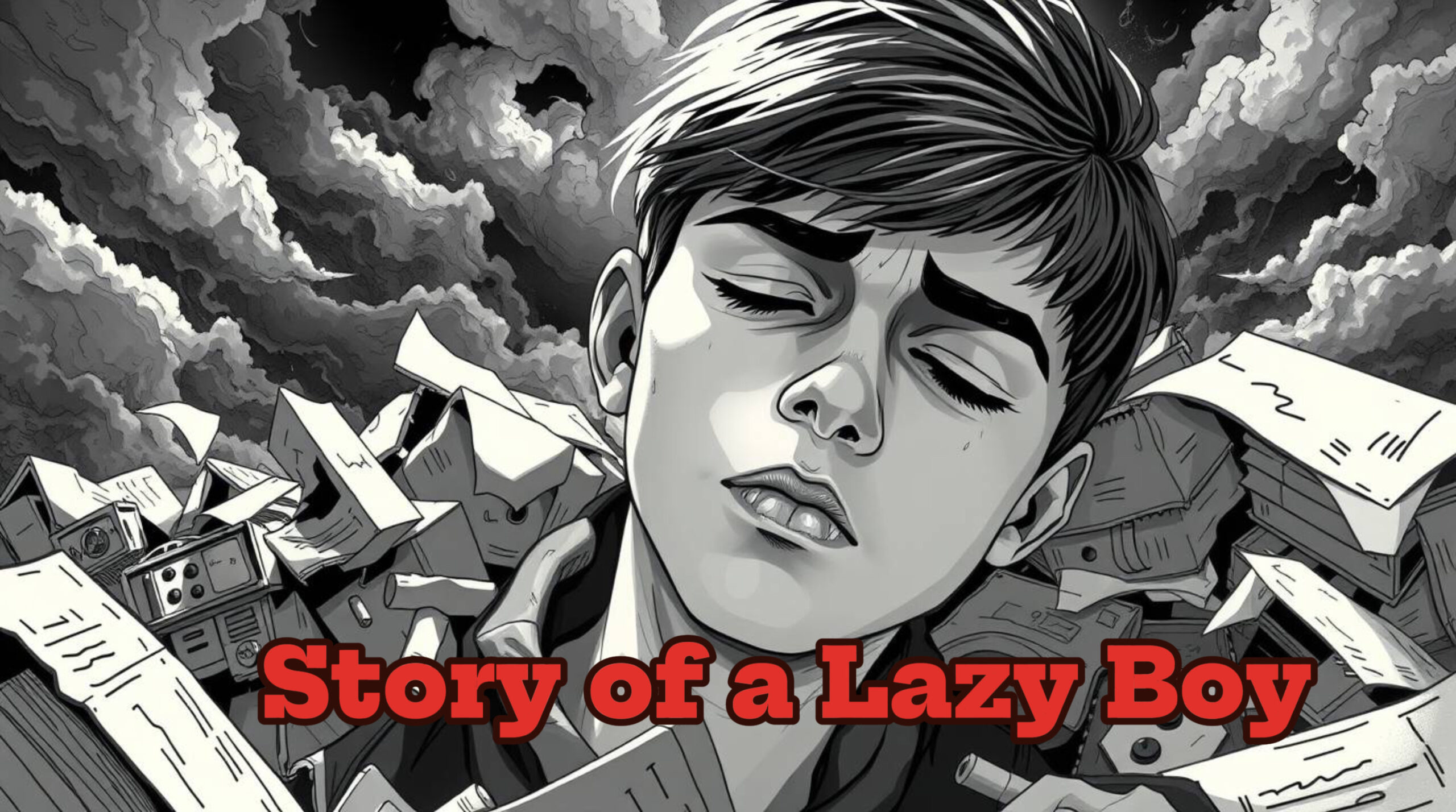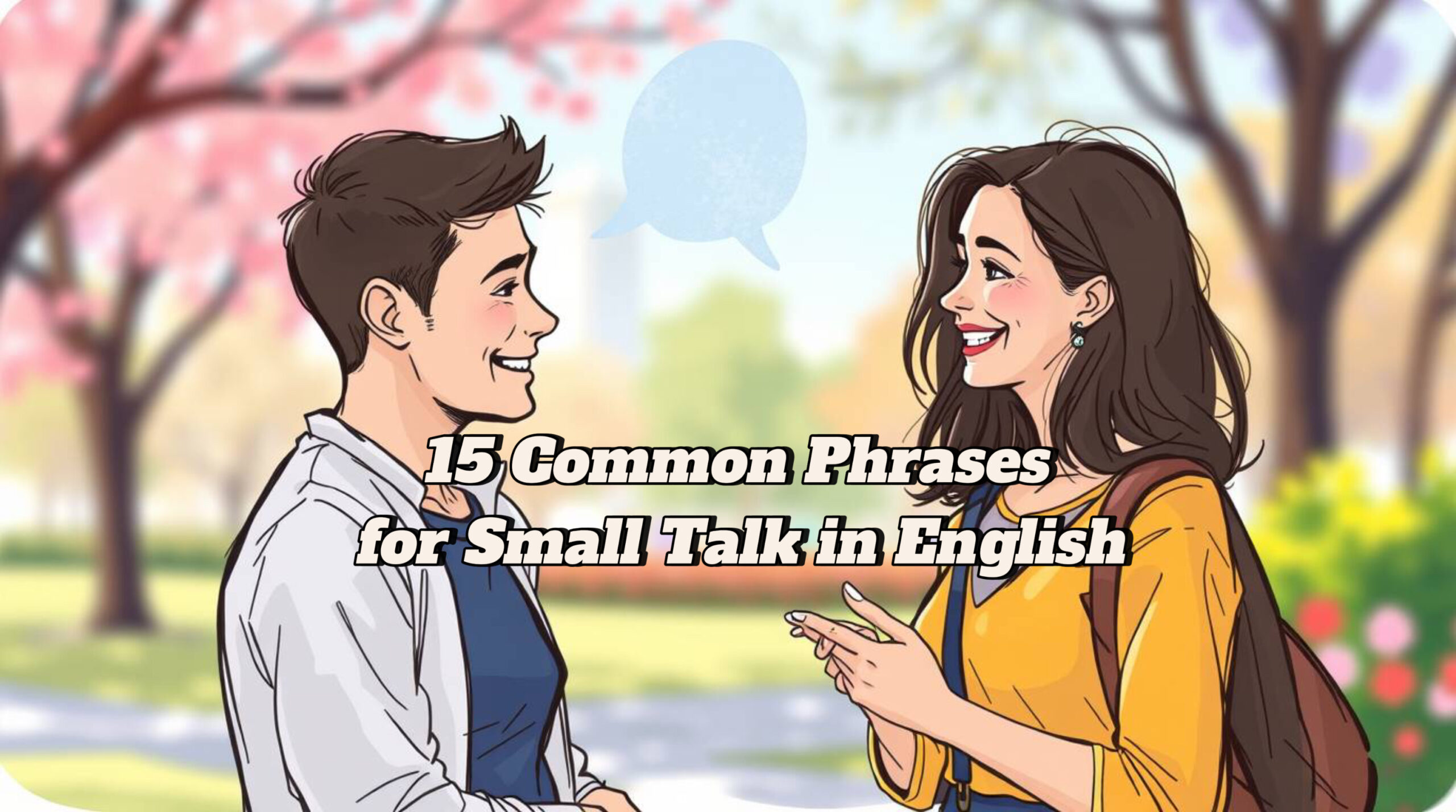Welcome to TalkEasy! This is the place where learning English becomes simple, fun, and effective. Whether you’re a beginner or someone looking to sharpen your skills, our stories, tips, and lessons are designed to help you grow in confidence and fluency.
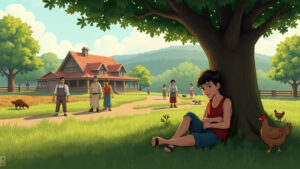
Chapter 1: The Village Boy (30 Minutes)
Welcome to our story! Let’s start in a quiet, peaceful village surrounded by green fields and tall trees. In this village, there was a large farm. On the farm lived a boy with his father and mother. They were a small family, but they had everything they needed.
The boy’s father was the landowner. He owned the farm, and many villagers worked for him. His father was a hardworking man. Every day, he woke up early and went to the fields. He worked with the farmers to grow crops and take care of the land.
The boy’s mother was also very busy. She took care of the house and the animals on the farm. She cooked food, cleaned, and made sure everything was in order. She was kind and loving, but she was also strong and hardworking.
But the boy was not like his parents. He was very different. He didn’t like to work. He didn’t want to study. While his father worked in the fields and his mother cleaned the house, the boy would sit under a tree and do nothing.
The boy was lazy. He liked to sleep late in the morning. When his father asked him to help on the farm, the boy said, “I’m too tired.” When his mother asked him to clean his room, he said, “I’ll do it later.” But later never came.
The villagers often talked about the boy. They said, “The boy is lucky to have such hardworking parents, but he is so lazy! What will happen to him in the future?”
The boy didn’t care. He spent his days dreaming and playing. He didn’t think about tomorrow or the future. He thought life would always be easy because his father owned the farm.
And so, the days passed. The boy’s parents hoped he would change. They wanted him to work hard, to study, and to grow into a responsible man. But the boy did not listen. He was happy being lazy.
This is how the story begins—with a boy, his loving parents, and a peaceful village. But life doesn’t stay the same forever. Soon, things will change for this boy, and he will learn many lessons.
Vocabulary Highlight:
– Landowner: A person who owns land.
– Fields: Large open areas of land used for farming.
– Crops: Plants grown by farmers, like rice or wheat.
– Hardworking: Someone who works a lot and tries their best.
– Lazy: Someone who doesn’t want to work or study.
Grammar Spotlight:
– Using simple present tense to describe daily habits (e.g., “The boy’s father works in the fields.”)
– Describing contrasts with “but” (e.g., “His parents were hardworking, but he was lazy.”)
Interactive Exercises:
Questions for Learners:
– Who lives on the farm?
– What kind of person is the boy’s father?
– What does the boy do every day?
Practice Sentences:
– The boy’s father is ______ (hardworking/lazy).
– The boy does not want to ______ (work/play).
Stay tuned for the next chapter, where the boy’s life begins to take a surprising turn!

Chapter 2: A Lovely Garden (30 Minutes)
One sunny morning, the boy sat in the garden near his house. It was a beautiful garden, full of colorful flowers, tall trees, and soft green grass. Birds were singing in the trees, and butterflies danced in the air. The boy liked this garden because it was quiet and peaceful.
The boy often came to this garden to relax. He would lie on the grass, close his eyes, and dream about life. He didn’t like to work, but he liked to dream. As he sat under a big tree, he thought to himself, “This is the best place in the world. I don’t need to work. I just need to enjoy my life.”
While the boy was sitting and dreaming, something happened. A girl walked past the garden. She was young and beautiful, with long hair and a kind smile. She was carrying a basket of flowers. The boy saw her and couldn’t stop looking.
“Who is she?” he thought. “I have never seen her before.”
The girl walked slowly, picking flowers and humming a soft song. The boy watched her from behind the tree. His heart started to beat faster. He felt something he had never felt before. It was love.
“She is the most beautiful girl I have ever seen,” the boy thought. “I want to know her name. I want to talk to her.”
But the boy was shy. He stayed behind the tree and didn’t say a word. The girl finished picking flowers and walked away. The boy sat under the tree, thinking about her. He couldn’t stop smiling.
From that day on, the boy came to the garden every morning, hoping to see the girl again. Sometimes she came to pick flowers, and sometimes she didn’t. When she came, the boy watched her quietly. He dreamed about talking to her, but he never had the courage to do so.
The boy didn’t realize it, but his life was starting to change. He wasn’t just lazy and careless anymore. He began to think about the girl all the time. For the first time in his life, he wanted something more than just sitting under a tree.
Who was this girl? What would happen if they talked? The boy didn’t know, but he was excited to find out.
Vocabulary Highlight:
– Basket: A container made of wood or plastic for carrying things.
– Flowers: Beautiful plants with bright colors, like roses or daisies.
– Humming: Singing a song softly without words.
– Shy: Feeling nervous or afraid to talk to people.
– Courage: The strength to do something even if it’s scary.
Grammar Spotlight:
– Using past continuous tense to describe ongoing actions in the past (e.g., “The girl was picking flowers.”).
– Expressing feelings with “felt” (e.g., “He felt something new.”).
Interactive Exercises:
Questions for Learners:
– What does the garden look like?
– How does the boy feel when he sees the girl?
– What does the girl do in the garden?
Practice Sentences:
– The boy felt ______ (happy/sad) when he saw the girl.
– The girl was ______ (picking flowers/sitting under the tree).
This chapter introduces the boy’s first feelings of love and shows how it begins to change him. Stay tuned for the next chapter, where the boy takes his first steps toward meeting the girl!

Chapter 3: Happy Together (40 Minutes)
After many days of watching the girl in the garden, the boy finally decided to speak to her. One morning, when she came to pick flowers, he gathered all his courage. Slowly, he walked up to her and said, “Hello.”
The girl turned to him and smiled. “Hello,” she said softly. The boy felt his heart beating fast, but he was happy that she smiled.
“What is your name?” he asked.
“My name is Lily,” she replied. “What’s yours?”
“I’m Tom,” the boy said. “I live on the farm nearby. I always see you picking flowers. Do you like flowers?”
“Yes, I love flowers,” Lily said. “They make me happy.”
Tom smiled and said, “The garden has the most beautiful flowers, but none are as beautiful as you.” Lily laughed, and they started talking. That day, they spent hours in the garden, walking, talking, and laughing.
As days went by, Tom and Lily spent more time together. Tom forgot about everything else. He didn’t think about work or study. He only thought about Lily. He wanted to make her happy.
One day, Lily said, “Tom, I love the flowers in the garden, but I wish I could have some of my own.”
Tom said, “I will buy you the most beautiful flowers!”
He went to the village market and spent his money on a big bouquet of roses. Lily was very happy. She smiled and thanked him. Seeing her smile made Tom feel proud.
Lily often talked about her dreams. She said, “Tom, I want to wear nice clothes and have beautiful things.”
Tom said, “Don’t worry, Lily. I will give you everything you want!”
Tom began to spend all his money on Lily. He bought her new dresses, shiny shoes, and expensive jewelry. He even threw small parties for her in the garden. He wanted to make her the happiest girl in the world.
But Tom didn’t realize something important: he was spending all his savings. His father often warned him, saying, “Tom, you need to save money for your future. Don’t waste it all now.”
But Tom didn’t listen. He said, “I don’t care about the future. I just want Lily to be happy today.”
For a while, Tom and Lily were very happy together. They walked in the garden, laughed, and enjoyed life. But Tom didn’t notice that things were changing. Lily was happy when she received gifts, but she didn’t care about Tom as much as he cared about her.
The villagers began to whisper. They said, “Tom is spending all his money on Lily. What will happen when he has nothing left?” But Tom didn’t listen to anyone. He was too focused on Lily.
Vocabulary Highlight:
– Courage: The strength to do something even if you are scared.
– Bouquet: A group of flowers tied together.
– Jewelry: Expensive items like rings, necklaces, or bracelets.
– Savings: Money kept for the future.
– Whisper: To speak very softly so others can’t hear.
Grammar Spotlight:
– Using past tense verbs for events (e.g., “He walked up to her.”).
– Expressing promises with will (e.g., “I will give you everything you want!”).
Interactive Exercises:
Questions for Learners:
– What is the girl’s name?
– What does Tom buy for Lily?
– What do the villagers think about Tom’s spending?
Practice Sentences:
– Lily said, “I love ______ (flowers/trees).”
– Tom ______ (spent/saved) all his money to make Lily happy.
This chapter shows how love can change people’s priorities, but it also hints at trouble ahead. In the next chapter, we will see what happens when Tom’s choices begin to catch up with him!

Chapter 4: Heartbreak (40 Minutes)
For many days, Tom and Lily were happy together. Tom spent all his time and money trying to make Lily smile. He thought they would always be together. But life doesn’t always go as planned.
One day, Lily came to the garden to meet Tom. Her face looked different—she wasn’t smiling like before. Tom noticed and asked, “Lily, is something wrong?”
Lily sighed and said, “Tom, I need to tell you something.”
Tom’s heart started to feel heavy. “What is it?” he asked.
Lily looked down and said, “I don’t think I want to be with you anymore.”
Tom was shocked. “What? Why, Lily? I love you! I’ve done everything to make you happy!”
Lily replied, “Yes, you’ve been very kind to me, but I need more. I want a different life, Tom. I’ve met someone else. He has more money, and he can give me everything I dream of.”
Tom couldn’t believe what he was hearing. “Lily, I gave you all I had. Wasn’t that enough?”
Lily shook her head and said, “I’m sorry, Tom. Goodbye.” Then she turned and walked away, leaving Tom alone in the garden.
For the next few days, Tom stayed in the garden, thinking about Lily. He couldn’t stop crying. He felt like his heart was broken into a million pieces.
“She left me,” Tom whispered to himself. “I gave her everything, but it wasn’t enough. Why did this happen to me?”
The villagers noticed Tom’s sadness. They said, “Poor Tom. He spent all his money on Lily, and now she’s gone.”
Tom felt lost. He didn’t know what to do. Every place in the village reminded him of Lily. The garden where they talked, the market where he bought her gifts—it all made him feel sad.
One day, Tom heard that Lily had married another man. The news broke his heart even more. He thought, “How could she forget me so quickly? Did she ever love me at all?”
Tom stopped talking to people. He stopped going to the garden. He stayed in his room, thinking about Lily and feeling sorry for himself. His parents tried to help him.
His father said, “Tom, I know you are sad, but life goes on. You must move forward.”
His mother said, “Tom, we love you. Please don’t give up.”
But Tom didn’t listen. He was too sad to hear their words.
Vocabulary Highlight:
– Heartbroken: Feeling very sad because of love.
– Sighed: To let out a deep breath to show sadness.
– Goodbye: A word used when leaving someone.
– Cry: To have tears come out of your eyes when you are sad.
– Lost: Not knowing what to do or where to go.
Grammar Spotlight:
– Using past perfect tense to describe actions completed before another action (e.g., “She had married another man.”).
– Describing emotions with “felt” (e.g., “Tom felt heartbroken.”).
Interactive Exercises:
Questions for Learners:
– Why does Lily leave Tom?
– How does Tom feel when Lily leaves him?
– What do the villagers say about Tom?
Practice Sentences:
– Tom felt ______ (happy/sad) after Lily left.
– Lily married ______ (Tom/another man).
This chapter shows the pain of heartbreak and how it affects Tom deeply. In the next chapter, we will see how Tom’s sadness begins to change his family and his life.
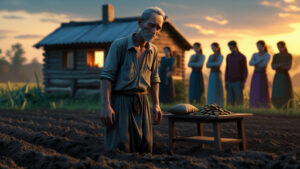
Chapter 5: The Father’s Sacrifice (40 Minutes)
Tom’s heartbreak made him lose all interest in life. He stopped working, stopped eating properly, and spent most of his time alone in his room. His parents, who loved him very much, became worried.
One evening, Tom’s father sat down with him. He said, “Tom, I know you are sad, but life doesn’t stop because of one bad moment. You must stand up and try again.”
Tom shook his head. “I can’t, Father. I feel so empty. Nothing makes sense without Lily.”
His father sighed. He looked at his son’s pale face and weak body. He thought, “I must do something to help him.”
The next morning, Tom’s father decided to take action. He called some villagers and asked them to lend money to Tom so he could start again. He promised them, “If Tom cannot repay you, I will give you some of my land.”
The villagers trusted Tom’s father because he was a kind and respected man. They said, “We will help Tom because you are a good man.”
With the money, Tom’s father tried to encourage him to start working on the farm again. He said, “Son, this is your chance to build a new life. Use this money wisely.”
But Tom was still too sad. He didn’t want to work. Instead, he spent the money carelessly.
After a few months, the villagers came back to Tom’s father. They said, “We gave you money, but Tom hasn’t paid us back. You promised to give us your land if he couldn’t repay us.”
Tom’s father looked at the villagers and said, “I will keep my promise.”
He sold part of his land to repay the villagers. It was a big sacrifice because the land was his family’s source of income. Without the land, it became harder for the family to survive.
Tom’s mother was very upset. She said, “Why did you do this? Now we have less land to grow crops. We will face hard times.”
But Tom’s father replied, “I did it for our son. He is lost right now, and he needs our support. As parents, it’s our duty to help him, no matter what.”
Tom saw how much his father was giving up for him, but he was still too sad to change. He felt guilty but didn’t know how to make things right.
Over time, the family’s situation became worse. With less land, they earned less money. Tom’s father worked harder than ever, trying to provide for the family. He grew tired and weak. One day, after working in the fields for many hours, he fell sick.
Even then, he said, “I am fine. Don’t worry about me.” But everyone could see that he was not fine. He had given so much to help his son, and now it was taking a toll on him.
Vocabulary Highlight:
– Sacrifice: To give up something important for someone else.
– Lend: To give something to someone for a short time.
– Repay: To give back money that you borrowed.
– Source of income: The way someone makes money.
– Toll: The damage or harm caused by something.
Grammar Spotlight:
– Using past tense verbs to describe actions (e.g., “He sold part of his land.”).
– Expressing obligation with must (e.g., “I must do something to help him.”).
Interactive Exercises:
Questions for Learners:
– What does Tom’s father do to help him?
– Why does Tom’s father sell part of his land?
– How does Tom feel about his father’s sacrifice?
Practice Sentences:
– The father sold his ______ (house/land) to help Tom.
– Tom’s father worked ______ (less/more) after selling the land.
This chapter highlights the love and sacrifice of a parent. It also shows how Tom’s sadness starts to affect his entire family. In the next chapter, we will see how these struggles lead to even more challenges for Tom’s family.
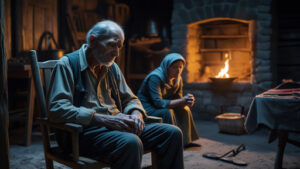
Chapter 6: Tragedy Strikes(40 Minutes)
The loss of their land and the constant stress had started to take a heavy toll on Tom’s father. He had worked so hard to help Tom, but now he was growing weaker every day. Tom’s mother could see how tired he was. She tried to care for him, but even her love couldn’t stop the effects of the hard work.
One cold evening, Tom’s father came home after working in the fields. He looked very tired. He sat down in his chair, breathing heavily.
“Father, you should rest,” Tom’s mother said, gently touching his arm.
“I’m fine, don’t worry,” he replied, though his voice was weak. “I’m just tired.”
Tom watched quietly from the other side of the room. He could see how much his father was struggling, but he didn’t know what to do.
A few days later, Tom’s father became very ill. He couldn’t get out of bed. He had a fever and couldn’t stop coughing. His mother was very worried and called for help, but no one could make him better.
The village doctor came and said, “His illness is from overwork and stress. He has been too tired for too long. His body cannot handle it anymore.”
Tom’s mother cried. “What can we do? He’s worked so hard for us. He’s given everything to help Tom!”
Tom’s father smiled weakly and said, “It’s my choice to help him. He is my son.” But the words were soft, and his eyes were tired.
Soon, the father became weaker. Every day, he could barely open his eyes. Tom tried to stay by his side, but he didn’t know how to help. His heart was heavy with guilt and sadness. He thought, “If only I had worked harder. If only I had listened to my father. Maybe he wouldn’t be so sick.”
One morning, Tom’s father closed his eyes for the last time. The room was silent. Tom’s mother cried out in pain. “No! Please, don’t leave us!”
But it was too late. Tom’s father was gone. The family was devastated. Tom felt empty inside. He had lost the one person who cared so much for him. He couldn’t understand why life had been so cruel to them.
Tom’s mother tried to stay strong. She still had Tom, and she wanted to protect him. But the sadness and stress took a toll on her too. Every day, she grew weaker. She didn’t eat properly and couldn’t sleep. Her heart was broken, and it showed in her health.
One day, Tom woke up and found his mother lying in bed, too weak to get up. He rushed to her side, but she didn’t wake up. “Mother, please, wake up!” Tom cried.
But his mother didn’t answer. She had passed away during the night, following her husband. Now, Tom was completely alone. His heart was filled with sorrow. He had lost both of his parents, and he didn’t know what to do.
The villagers were very sad to hear about Tom’s mother. They said, “First the father, now the mother. The boy has no one left.” But even though the villagers spoke kindly to him, Tom felt like there was no hope left for him.
Vocabulary Highlight:
– Toll: The effect of something harmful or difficult.
– Weak: Not strong, feeling tired or sick.
– Stress: A feeling of worry caused by too much work or difficult situations.
– Ill: Sick.
– Devastated: Feeling very sad and unable to cope.
Grammar Spotlight:
– Using past continuous tense to describe actions happening over time (e.g., “He was working too much.”).
– Expressing possibility with could (e.g., “Maybe he could have lived longer.”).
Interactive Exercises:
Questions for Learners:
– Why does Tom’s father become sick?
– What happens to Tom’s father?
– How does Tom feel after losing both his parents?
Practice Sentences:
– Tom’s father became ______ (strong/weak) from stress.
– Tom’s mother felt ______ (better/worse) after her husband passed away.
This chapter highlights the pain of losing both parents. Tom is now alone in the world, and the loss is difficult to bear. In the next chapter, we will see what happens to Tom and how the villagers try to help him.
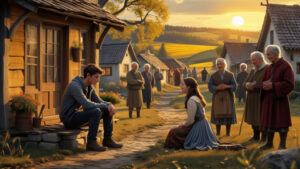
Chapter 7: A New Wife (40 Minutes)
After Tom lost both of his parents, he felt more alone than ever. He didn’t know what to do with his life. Every day felt the same—sad and empty. The villagers saw how much he was suffering, and they wanted to help him. They knew that Tom needed someone who could care for him and bring happiness back into his life.
One evening, the village elders gathered together to discuss Tom’s future. They said, “We cannot let Tom live alone. He is too young and too sad. Perhaps a new wife will help him heal.”
The villagers agreed. They decided to find a kind girl who could be a good wife to Tom. They asked around, and soon they found a girl named Anna. Anna was kind, gentle, and hardworking. She was from a good family, and the villagers believed she would be perfect for Tom.
One afternoon, the villagers brought Anna to Tom’s house. She was a little nervous, but she smiled when she saw Tom. Tom looked at her with sadness in his eyes, but he didn’t say anything. Anna gently said, “Hello, Tom. I hope we can be good friends.”
Tom didn’t reply at first. He was still thinking about his parents. But he could see that Anna was kind. She didn’t try to make him forget his past, but she gave him space and time.
Over the next few weeks, Anna visited Tom every day. She brought him food, cleaned his house, and even helped him with small tasks around the farm. Slowly, Tom began to feel a little better. He started to look forward to seeing her.
Anna didn’t push him to talk about his past. She just listened when he wanted to talk, and she comforted him when he cried. Slowly, Tom began to feel less alone. He saw how kind Anna was, and he realized that she was a good person who truly cared about him.
One evening, after a long day of work, Tom sat down next to Anna. He said, “Thank you for being kind to me. I never thought I could be happy again.”
Anna smiled. “I’m happy to help, Tom. You don’t have to be sad forever. Life can get better.”
As time passed, Tom began to feel more hopeful. He started working harder on the farm, and his energy returned. The sadness he had carried for so long slowly started to fade. He felt like he had a new chance at life, and Anna had helped him find it.
One day, Tom looked at Anna and said, “I think I want to marry you. You’ve helped me more than I can ever thank you for.”
Anna’s eyes brightened, and she said, “I would love to marry you, Tom.”
The villagers were happy to see Tom and Anna together. They celebrated the wedding, and for the first time in a long time, Tom felt truly happy. He had found someone who cared for him, and he knew that together they could create a new life.
Vocabulary Highlight:
– Heal: To feel better after a difficult time or illness.
– Gentle: Kind and careful in behavior.
– Comfort: To make someone feel better when they are sad.
– Push: To try to make someone do something they don’t want to do.
– Celebrate: To enjoy and show happiness for something special.
Grammar Spotlight:
– Using modals like could and would to show possibility and willingness (e.g., “I would love to marry you.”).
– Describing actions with present perfect tense(e.g., “Tom has started working harder.”).
Interactive Exercises:
Questions for Learners:
– Why do the villagers think Tom needs a wife?
– How does Anna help Tom feel better?
– What does Tom say to Anna after spending time with her?
Practice Sentences:
– Anna was very ______ (kind/angry) to Tom.
– Tom felt ______ (better/worse) after spending time with Anna.
This chapter marks the beginning of a new chapter in Tom’s life. Anna’s kindness helps him start healing from his past sadness. In the next chapter, we will see the new challenges Tom faces and how he continues to move forward.

Chapter 8: Adopting Children (40 Minutes)
Tom and Anna’s life together was filled with more happiness than Tom had ever thought possible. Anna’s love had healed his heart, and every day, they worked together on the farm, building a peaceful and joyful life. They enjoyed each other’s company, and for the first time in a long time, Tom felt truly content.
But after some time, Anna noticed that Tom seemed a little sad again. One day, as they sat together after a long day of work, Anna gently said, “Tom, do you ever think about having children? I know that we are happy together, but I think it would be nice to have a family.”
Tom thought for a moment. He had always dreamed of having a family, but after losing his parents, he wasn’t sure if he could ever have the same kind of happiness again. He looked at Anna and smiled. “I think it would be wonderful,” he said. “I think it’s time for us to have a family.”
They decided to adopt a child. The villagers helped them find a little girl who had no parents. She was around six years old, with bright eyes and a shy smile. Her name was Lily, and she had been living with her grandmother after losing her parents to illness. Her grandmother was too old to take care of her, so Lily needed a new home.
When Anna and Tom met Lily for the first time, they both knew she was meant to be a part of their family. Tom smiled and said, “Lily, we will take care of you. You are now part of our family.” Lily’s eyes sparkled as she nodded, feeling both nervous and excited.
The next few months were full of joy as Tom, Anna, and Lily became a family. They spent time playing together, working on the farm, and taking walks in the countryside. Tom and Anna taught Lily how to care for the animals, and Lily helped Anna cook dinner every evening. Slowly, she became more comfortable and began to smile more.
But even as they enjoyed their time with Lily, Tom and Anna both felt that something was still missing. They wanted to give Lily a brother or a sister to grow up with, someone to share her life with. So, after much thought, they decided to adopt again.
This time, they adopted a young boy named Max. Max was about four years old, and he had been living in an orphanage after his parents had passed away in a terrible accident. When Tom and Anna first met Max, they knew right away that he was the perfect match for their family.
Max was a shy little boy, but his eyes were full of curiosity. He was nervous at first, not sure what to expect from his new parents, but Tom and Anna showed him love and patience. Slowly, Max began to trust them, and just like Lily, he started to feel at home in their family.
As the months passed, Tom and Anna’s family grew stronger. Lily and Max became close friends, playing together and laughing together. Tom and Anna were proud of the children they had adopted, and they worked hard to give them the best life they could.
Tom would sometimes sit in the evening, watching his children run and play in the garden. He thought to himself, “I never imagined my life could be this full of love and happiness. I am truly blessed.”
Vocabulary Highlight:
– Adopt: To take care of a child who is not your own.
– Content: Happy and satisfied.
– Curiosity: A desire to learn or know about something.
– Match: Something that is perfect or right for someone.
– Patience: The ability to wait without getting upset.
Grammar Spotlight:
– Using past perfect tense to describe events that happened before another event in the past (e.g., “They had decided to adopt a child.”).
– Expressing future plans with “will” (e.g., “They will take care of you.”).
Interactive Exercises:
Questions for Learners:
– Why did Anna and Tom decide to adopt a child?
– How did Lily and Max feel when they were adopted?
– What kind of family did Tom and Anna want to have?
Practice Sentences:
– Tom and Anna ______ (adopted/forgot) two children.
– The children played ______ (together/alone) in the garden.
In this chapter, Tom and Anna create a family filled with love and care by adopting Lily and Max. Their home is now full of happiness and laughter. In the next chapter, we will see how their life continues to change as new challenges come their way.

Chapter 9: Illness and Loss (30 Minutes)
Tom and Anna had built a happy life with their two children, Lily and Max. Every day was filled with love, laughter, and the joys of family life. But life is not always easy, and sometimes, it brings unexpected sadness.
One day, Anna started feeling tired. At first, she thought it was because of all the work on the farm and at home. She would say, “I just need some rest.” But as the days turned into weeks, her tiredness did not go away. Instead, she began to feel weaker.
Tom noticed the change and became worried. “Anna,” he said, “you need to see a doctor.” But Anna smiled and said, “Don’t worry, Tom. I’ll be fine.”
However, as time passed, Anna’s health became worse. She could not do her daily work anymore, and even walking became hard for her. Tom was very worried. He took Anna to the village doctor. The doctor looked very serious and said, “Anna is very sick. She needs a lot of care, and she must rest all the time.”
Tom did everything he could to help Anna. He cooked, cleaned, and took care of the children. Lily and Max also helped. Lily brought Anna water and flowers from the garden, while Max would sit next to her and tell her funny stories to make her smile.
Anna was happy to see how much her family loved her, but her illness did not get better. Every day, Tom sat beside her and held her hand. He said, “Don’t worry, Anna. We will get through this together.”
One quiet evening, Anna looked at Tom with tears in her eyes. “Tom,” she said, “thank you for everything. You and the children are my greatest happiness.”
Tom tried to stay strong, but his heart was breaking. He whispered, “We love you, Anna. You are our light.”
A few days later, Anna passed away. It was a very sad day for Tom, Lily, and Max. Their home, which was once full of laughter, became quiet. The children cried and asked Tom, “Why did Anna leave us?”
Tom hugged them tightly and said, “Anna loved us very much. She will always be in our hearts.”
Life became very hard for Tom. He had to take care of the children and work on the farm all by himself. Every night, he sat alone, thinking about Anna. But he knew he had to stay strong for Lily and Max.
Slowly, the family began to heal. They missed Anna every day, but they remembered her kindness and love. Together, they promised to keep her memory alive by being kind and helping each other.
Vocabulary Highlight:
– Illness: A time when someone is sick or not healthy.
– Rest: To stop working and relax.
– Care: To look after someone who needs help.
– Promise: To say you will do something for sure.
– Memory: Something you remember about the past.
Grammar Spotlight:
– Using past simple tense for completed actions (e.g., “Anna passed away.”).
– Describing actions with past continuous tense (e.g., “Tom was cooking and cleaning.”).
Interactive Exercises:
Questions for Learners:
– Why did Anna become weak and tired?
– What did Tom and the children do to help Anna?
– What did Tom say to Lily and Max after Anna passed away?
Practice Sentences:
– Anna was very ______ (sick/strong).
– The children ______ (helped/forgot) Anna when she was sick.
This chapter shows a very sad time in Tom and his family’s life. It teaches us the importance of love, care, and staying strong in hard times. In the next chapter, we will see how Tom and the children try to move forward after Anna’s loss
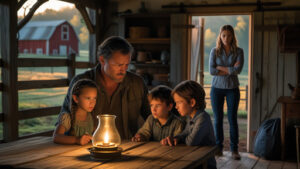
Chapter 10: A Second Marriage (30 Minutes)
After Anna passed away, life became very difficult for Tom. He had to take care of Lily and Max while also working hard on the farm. Every day, he woke up early to feed the animals, work in the fields, and make sure the children had everything they needed. He loved Lily and Max very much, but it was not easy to do everything alone.
The villagers noticed how tired Tom looked. One day, an elder said, “Tom, you need someone to help you. You should think about getting married again.” At first, Tom wasn’t sure. He still missed Anna so much. But after some time, he realized that having a wife might make life easier for his family.
In a nearby village, there was a woman named Clara. She was young and seemed strong. The villagers introduced her to Tom, and they agreed to get married. Clara moved into Tom’s house, and at first, everything seemed fine. Tom hoped she would bring happiness back into their home.
However, it didn’t take long for problems to start. Clara was not kind to Lily and Max. She didn’t treat them like her own children. When Tom was working on the farm, Clara would yell at the children if they made a mistake. Sometimes, she would give them extra chores to do, even when they were tired from helping on the farm.
“Why does she treat us like this?” Max whispered to Lily one evening. Lily just shook her head. “I don’t know, but we have to be careful.”
One day, Clara became very angry when Max accidentally spilled some water. Instead of helping him clean it up, she scolded him loudly and made him feel bad. Tom came into the house and saw Max crying. “What happened?” Tom asked.
Clara quickly replied, “Your son is careless! He spilled water everywhere. I’m only teaching him to be careful.”
Tom didn’t know what to say. He wanted to believe Clara, but he also felt something was wrong. Over time, he noticed that Lily and Max were always quiet and scared when Clara was around.
One evening, after dinner, Tom sat down with the children. “Is everything okay?” he asked. Lily looked at Max, and Max looked at Lily. Finally, Lily said, “Clara is not kind to us, Father. She makes us do a lot of work, and she always shouts at us.”
Tom felt very sad. He loved his children and wanted to protect them. He decided to talk to Clara. “Clara,” he said, “you need to treat Lily and Max kindly. They are children, and they deserve love.”
Clara became angry. “If you think I’m wrong,” she said, “then you must choose—me or the children!”
Tom couldn’t believe what he was hearing. He loved Clara, but he loved his children more. He looked at her and said, “I choose my children. They are my family, and I will always protect them.”
Clara was very upset. She packed her things and left the house that same night. Tom, Lily, and Max were sad, but they also felt a little relief. They knew that their family would be okay as long as they had each other.
Vocabulary Highlight:
– Introduce: To bring two people together so they can meet.
– Scold: To speak angrily to someone when they do something wrong.
– Careless: Not careful; making mistakes.
– Protect: To keep someone safe from harm.
– Relief: A feeling of comfort after something difficult is over.
Grammar Spotlight:
– Using reported speech to share what someone said (e.g., “Max whispered to Lily, ‘Why does she treat us like this?’”).
– Using conditional sentences (e.g., “If you think I’m wrong, then you must choose.”).
Interactive Exercises:
Questions for Learners:
– Why did Tom decide to marry Clara?
– How did Clara treat Lily and Max?
– What did Tom say to Clara when she asked him to choose?
Practice Sentences:
– Clara was ______ (kind/unkind) to the children.
– Tom chose his ______ (wife/children).
This chapter shows how important it is to stand up for the people you love, even when it is hard. In the next chapter, we will see how Tom and the children try to move forward and find peace in their lives.

Chapter 11: A Tough Decision (30 Minutes)
After Clara gave Tom the difficult choice—to stay with her or to protect his children—Tom knew what he had to do. He loved his children more than anything and couldn’t let them suffer. That night, he stayed awake, thinking about his family’s future.
The next morning, Tom called Clara. “Clara,” he said, “I made my decision. I choose my children. They need my love and protection.” Clara’s face turned red with anger. “Fine,” she said, “if that’s your choice, I will leave!” Without another word, she packed her belongings and walked out of the house.
Although the house felt quiet and empty after Clara left, Tom, Lily, and Max felt a sense of relief. They no longer had to worry about being mistreated. “Father,” said Lily, “thank you for standing up for us.” Tom smiled and hugged the children. “You are my family, and I will always protect you.”
The villagers soon heard about what had happened. Some of them supported Tom and said, “You made the right choice.” But others whispered, “It’s not easy to live without a wife. What will Tom do now?”
Tom didn’t let their words bother him. He was determined to raise Lily and Max with love and care. “We may not have much,” he said to his children, “but we have each other. That’s enough for me.”
Life wasn’t easy for Tom and the children after Clara left. Tom had to work harder to keep the farm running and to take care of the children. Lily and Max helped as much as they could. Lily would cook and clean, while Max worked in the garden. Together, they made the best of their situation.
One day, Max said, “Father, we don’t need anyone else. We are happy with just the three of us.” Tom smiled and said, “Yes, Max. As long as we stick together, we can face anything.”
Even though times were tough, the family started to feel stronger. Tom taught Lily and Max important lessons about life. He said, “No matter what happens, always be kind and stand up for what is right. Family is the most important thing in the world.”
As the weeks went by, Tom realized that the love and support of his children gave him strength. He promised himself that he would never let anything or anyone hurt them again. Together, they faced each day with hope and courage.
Vocabulary Highlight:
– Belongings: The things a person owns, like clothes or personal items.
– Relief: A feeling of comfort after a problem is solved.
– Support: To help or encourage someone.
– Determined: Very sure about doing something and not giving up.
– Courage: The strength to face something difficult.
Grammar Spotlight:
– Using past simple tense to describe completed actions (e.g., “Clara left the house.”).
– Using future tense to express promises (e.g., “I will always protect you.”).
Interactive Exercises:
Questions for Learners:
– What decision did Tom make about Clara?
– How did Lily and Max help Tom after Clara left?
– What lesson did Tom teach his children?
Practice Sentences:
– Tom ______ (chose/ignored) to protect his children.
– The family felt ______ (stronger/weaker) after Clara left.
This chapter teaches us the importance of making tough decisions to protect the people we love. In the next chapter, we will see how Tom and his children work together to rebuild their lives and stay strong as a family.

Chapter 12: The Boy’s Death (40 Minutes)
Life was not easy for Tom, Lily, and Max after Clara left. Tom worked very hard on the farm every day. He wanted to make sure Lily and Max had food to eat and a place to live. The children also helped as much as they could. They were a small family, but they loved and supported each other.
However, the long days of hard work started to affect Tom’s health. He was often tired and didn’t feel as strong as he used to. “Father, you should rest,” Lily would say. But Tom would smile and reply, “I will rest later. Right now, I need to take care of you and Max.”
One day, Tom began to feel very weak. He had a fever and couldn’t get out of bed. Lily and Max were worried. They brought him water and food, but Tom grew sicker with each passing day.
The villagers heard about Tom’s illness. Some came to visit and brought soup and medicine, but it didn’t help. Tom called Lily and Max to his side and said, “My dear children, I am so proud of you. You are strong and kind, and I know you will take care of each other.”
Lily held his hand and cried, “Please don’t leave us, Father.” Max hugged him and said, “We will always remember you.” Tom smiled at them one last time and said, “I love you both.”
A few days later, Tom passed away. It was a very sad time for Lily and Max. They had already lost their mother, and now they had lost their father too. They were all alone in the world.
At first, the villagers helped them a little. They gave them some food and clothes, but they didn’t care for Lily and Max for long. “We can’t take care of them forever,” some villagers said. Soon, the children had to look after themselves.
Lily and Max decided to work hard to survive. Lily cleaned houses in the village, and Max helped farmers with their work. It was difficult, but they didn’t give up. “Father always told us to be strong,” Lily said. “We can do this.”
Every evening, after their work was done, Lily and Max would sit together and talk about their parents. “Father and Mother loved us so much,” Max said. “We have to make them proud.” Lily nodded and said, “Yes, we must stay strong and help each other, no matter what.”
Even though life was hard, Lily and Max stayed hopeful. They believed that one day, something good would happen, and they would have a better life. They remembered their father’s words: “Family is the most important thing.” And so, they faced each new day together, with courage and love.
Vocabulary Highlight:
– Fever: When someone’s body becomes very hot because they are sick.
– Proud: Feeling happy about someone’s good actions or success.
– Survive: To keep living, even in hard times.
– Support: To help someone when they need it.
– Hopeful: Feeling positive about the future.
Grammar Spotlight:
– Using past continuous tense to describe actions in progress (e.g., “Lily was cleaning houses.”).
– Expressing emotions with past simple tense (e.g., “Lily cried when her father spoke to her.”).
Interactive Exercises:
Questions for Learners:
– What happened to Tom after working hard for many years?
– How did Lily and Max survive after their father passed away?
– What did the children remember about their parents?
Practice Sentences:
– Tom became ______ (sick/strong) because of hard work.
– The children worked hard to ______ (survive/relax).
This chapter reminds us that life can be very hard, but with courage and determination, we can face even the toughest challenges. In the next chapter, we will see how Lily and Max’s lives change when they meet someone new.

Chapter 13: Life in the Village (40 Minutes)
After their father’s death, Lily and Max were left all alone. The small house they lived in felt very quiet and empty. The villagers helped them for a few days, bringing food and clothes. But soon, they stopped. “We have our own families to take care of,” they said. Lily and Max realized that they had to look after themselves.
At first, life was very hard. Lily and Max didn’t know how to do everything on their own. They had no money to buy food or clothes. Their father had always taken care of these things. But now, they had to learn how to survive.
One morning, Lily said, “Max, we need to work. We can’t sit here and wait for help.” Max nodded. “I can help the farmers,” he said. “And I can clean houses,” Lily added.
Lily went to the village and knocked on people’s doors. “Can I help clean your house?” she asked. Some villagers said yes, and Lily worked very hard. She swept the floors, washed the clothes, and cleaned the dishes. At the end of the day, they gave her some coins and sometimes a little food.
Max went to the farms and asked the farmers, “Can I help you?” The farmers let him carry water, feed the animals, and plant seeds. It was hard work, but Max didn’t complain. He was happy to earn something for his sister and himself.
Every evening, Lily and Max would sit together and count their coins. “We don’t have much,” Lily said, “but it’s enough to buy bread and milk.” Max smiled and said, “We are doing well. Father would be proud of us.”
The villagers watched Lily and Max from a distance. Some people admired their hard work. “Those children are very brave,” they said. But others didn’t care. “They’re just orphans,” they whispered. Lily and Max didn’t listen to the unkind words. They focused on their work and stayed strong.
One day, Max came home with a bag of vegetables. “Look, Lily! A farmer gave me these because I worked extra hours.” Lily smiled and said, “That’s wonderful, Max! Let’s cook a nice meal tonight.”
Although their lives were full of challenges, Lily and Max learned to take care of each other. They cleaned their small house, cooked their meals, and saved every coin they earned. “We don’t need much,” Lily said one evening. “As long as we are together, we will be okay.”
The children grew stronger and wiser with each passing day. They missed their parents, but they remembered their father’s words: “Be kind, work hard, and never give up.” These words gave them strength when life felt difficult.
Vocabulary Highlight:
– Survive: To live through difficult situations.
– Struggle: To face challenges or difficulties.
– Earn: To get something (like money) by working.
– Orphan: A child whose parents have died.
– Admire: To respect or look up to someone.
Grammar Spotlight:
– Using present continuous tense for ongoing actions (e.g., “Lily is cleaning houses.”).
– Using past simple tense to describe events (e.g., “The villagers helped them for a few days.”).
Interactive Exercises:
- Questions for Learners:
– How did Lily and Max survive in the village?
– What kind of work did Lily do? What did Max do?
– Why did some villagers admire the children?
Practice Sentences:
– Lily and Max learned to ______ (help/take care of) themselves.
– The villagers ______ (helped/did not help) the children for long.
This chapter shows how Lily and Max faced their struggles with hard work and courage. In the next chapter, we will see how their lives begin to change when someone new enters their story.

Chapter 14: The Kind Merchant (40 Minutes)
One sunny morning, a merchant arrived in the village. He was a kind man who traveled from place to place, selling goods like clothes, food, and tools. His cart was full of colorful fabrics and shiny objects, and the villagers gathered around him to see what he had brought.
The merchant greeted everyone with a warm smile. “Good morning, my friends! Come and see what I have!” The villagers were excited and started buying things from him. While the merchant was busy, he noticed two children sitting under a tree, watching quietly. It was Lily and Max.
The merchant saw their worn-out clothes and tired faces. He asked a villager, “Who are those children? Why do they look so sad?” The villager replied, “Oh, they are orphans. Their parents passed away, and now they live alone. They work hard, but life is not easy for them.”
The merchant felt very sorry for Lily and Max. “No child should live like this,” he thought. He finished his business in the village and decided to talk to them. He walked over to the tree where they were sitting.
“Hello, children,” he said gently. “What are your names?”
Lily stood up and said, “I’m Lily, and this is my brother, Max.” Max smiled shyly and said, “Hello, sir.”
The merchant sat down beside them. “I heard about your story,” he said. “You are very brave to take care of each other. Tell me, how are you managing?”
Lily answered, “We work for the villagers. I clean houses, and Max works on the farms. We save our money to buy food.”
The merchant nodded. “That’s very good, but you are too young to work so hard. You deserve to have a better life.”
The children looked at him with wide eyes. “A better life?” Max asked. The merchant smiled and said, “Yes, a better life. You need someone to care for you, to give you a safe home, and to help you grow.”
The merchant thought for a moment and then said, “How about this? Come with me to the city. I have a big house, and I can give you a good life. You won’t have to work so hard anymore.”
Lily and Max looked at each other. They didn’t know what to say. Lily said, “But we don’t know you, sir. What if something bad happens?” The merchant nodded and said, “That’s a smart question. I understand your worry. But I promise, I will take care of you like my own children. You can trust me.”
The children thought about it for a long time. Finally, Max said, “Can we think about it for one more day?” The merchant smiled. “Of course, take your time. I will be in the village tomorrow.”
That night, Lily and Max talked about the merchant’s offer. “What do you think?” Lily asked. Max said, “I think he is kind, but I’m scared to leave the village. This is our home.” Lily nodded. “Me too. But maybe this is our chance to have a better life.”
The next day, Lily and Max went to see the merchant. Lily said, “We have decided. We will come with you.” The merchant smiled warmly. “You’ve made the right choice,” he said. “From now on, I will take care of you.”
Vocabulary Highlight:
– Merchant: A person who sells things, often traveling from place to place.
– Orphan: A child whose parents have died.
– Brave: Showing courage and not being afraid.
– Promise: To say you will definitely do something.
– Trust: To believe that someone is good and honest.
Grammar Spotlight:
– Using direct speech to show conversations (e.g., “What are your names?” the merchant asked.).
– Using past simple tense to describe actions (e.g., “The merchant arrived in the village.”).
Interactive Exercises:
Questions for Learners:
– Who visited the village?
– What did the merchant notice about Lily and Max?
– What offer did the merchant make to the children?
Practice Sentences:
– The merchant wanted to ______ (help/ignore) the children.
– Lily and Max felt ______ (excited/scared) about leaving the village.
This chapter teaches us the importance of kindness and helping those in need. In the next chapter, we will follow Lily and Max as they begin their journey to a new life in the city.

Chapter 15: A Helping Hand(40 Minutes)
The next morning, the sun rose brightly over the village. Lily and Max packed their few belongings into a small bag. They were nervous but also excited. They had decided to trust the merchant, hoping he would give them a better life.
The merchant arrived with his cart, smiling warmly. “Are you ready, children?” he asked. Lily nodded, holding Max’s hand tightly. “We are ready,” she said. The villagers gathered around to see them off. Some looked happy for the children, while others whispered quietly, “Will they really be safe in the city?”
The merchant reassured the villagers, “I will care for them as if they are my own children. You have my word.”
Lily and Max climbed into the cart. The merchant handed them a soft blanket and some bread to eat during the journey. “This is a long trip, but don’t worry,” he said kindly. “We’ll stop to rest along the way.”
As the cart began to move, Lily and Max looked back at the village. It had been their home for as long as they could remember. “Goodbye,” Max whispered. Lily squeezed his hand and said, “We’ll always have these memories, Max. But now, we have to think about the future.”
The journey to the city was full of new sights and sounds. The children saw rivers, forests, and small towns along the way. The merchant told them stories to keep them entertained. “I started working when I was just a boy,” he said. “I traveled to many places and met many people. That’s how I became a merchant.”
Lily and Max listened closely. They had never met anyone who traveled so much. “You’re very brave,” Max said. The merchant smiled. “And now, you are brave too. It takes courage to leave your home and start a new life.”
When they stopped to rest, the merchant gave Lily and Max fresh fruits and water. He asked, “Do you feel okay? Are you comfortable?” Lily nodded. “You are very kind, sir,” she said. “We are lucky to have met you.”
The merchant shook his head. “No, I am the lucky one. You are good children, and I am happy to help you.”
As the cart moved closer to the city, the children began to feel a little nervous. “What will the city be like?” Max asked. The merchant replied, “The city is busy and full of people. But don’t worry, my house is quiet and safe. You will like it there.”
Lily looked at Max and said, “As long as we are together, we will be okay.” The merchant smiled. “That’s the spirit, Lily. Family is about staying together and helping each other.”
When they finally reached the city, the children were amazed. They saw tall buildings, busy streets, and people from many different places. The merchant pointed to a large house in the distance. “That’s my home,” he said. “Welcome to your new life.”
Lily and Max felt a mix of excitement and hope. They had left behind their struggles in the village and were ready to begin a new chapter.
Vocabulary Highlight:
– Journey: A long trip from one place to another.
– Reassure: To make someone feel less worried.
– Memories: Things you remember from the past.
– Courage: Being brave in difficult situations.
– Entertained: To keep someone interested or happy.
Grammar Spotlight:
– Using future tense for plans and hopes (e.g., “We will stop to rest along the way.”).
– Using past simple tense to describe actions (e.g., “The cart began to move.”).
Interactive Exercises:
Questions for Learners:
– What did the merchant promise to the villagers?
– How did Lily and Max feel during the journey?
– What did the children see on their way to the city?
Practice Sentences:
– The merchant gave the children ______ (food/coins) during the journey.
– Lily and Max were ______ (excited/nervous) to see the city.
This chapter shows how kindness and trust can create opportunities for a new beginning. In the next chapter, we will see how Lily and Max adjust to their life in the city with the merchant’s help.

Chapter 16: A Fresh Start (40 Minutes)
Lily and Max stared in amazement as the cart rolled through the busy city streets. Everything was so different from their small village. The roads were wide and filled with people. There were shops with colorful signs, and the smell of freshly baked bread and roasted nuts filled the air.
“This place is so big!” Max said, his eyes wide with wonder. Lily nodded. “I’ve never seen so many people in one place.”
The merchant smiled. “Welcome to the city, children. This is your new home.”
The cart stopped in front of a large house with a garden full of flowers. The house was painted white, with a red roof and tall windows. “Come inside,” the merchant said, helping them down from the cart.
As they walked through the house, Lily and Max couldn’t believe their eyes. The rooms were clean and bright, with soft rugs on the floors and big windows that let in sunlight. There was even a small library with shelves full of books.
“This is your room,” the merchant said, opening a door. Inside were two small beds with fluffy blankets, a wooden table, and a window that looked out at the garden. “Do you like it?”
Lily smiled and said, “It’s perfect. Thank you so much.” Max ran to the bed and jumped on it. “This is the softest bed I’ve ever felt!” he exclaimed.
That evening, the merchant cooked dinner for them. It was the best meal they had ever eaten—fresh bread, soup, and sweet fruits. As they sat together at the table, the merchant said, “From now on, this is your home. You don’t need to work hard like before. You can just be children.”
Lily and Max felt their worries melt away. They were finally safe and cared for.
The next morning, the merchant gave them clean clothes and shoes. “Today, I will show you the city,” he said. They visited the market, where vendors sold fruits, vegetables, and spices. They saw a park with children playing and even went to a small school.
“This is where you will study,” the merchant said, pointing to the school. “You will learn to read, write, and do many other things.”
Max looked up at the merchant. “We’ve never been to school before. What if we’re not good at it?”
The merchant knelt down and said, “You don’t have to be perfect. You just have to try your best. And I will always be here to help you.”
Over the next few weeks, Lily and Max started their new life. They made friends in the neighborhood, helped the merchant with small chores, and began learning in school. They worked hard and were excited to learn new things.
At night, they would sit with the merchant in the library and listen to his stories about his travels. “You’ve seen so much of the world,” Lily said one evening. “I hope I can be like you one day.”
The merchant smiled. “You can be anything you want, Lily. All you need is courage and hard work.”
Lily and Max were happier than they had ever been. They had a safe home, enough food, and someone who cared for them deeply. For the first time in their lives, they felt hope for the future.
Vocabulary Highlight:
– Amazement: A feeling of great surprise or wonder.
– Vendor: A person who sells things, especially in a market.
– Library: A place with many books for reading.
– Chores: Small jobs or tasks, like cleaning or helping around the house.
– Courage: The ability to face fear or difficulty.
Grammar Spotlight:
– Using present simple tense for routines and habits (e.g., “They visit the market every morning.”).
– Using past simple tense for events that already happened (e.g., “The merchant cooked dinner for them.”).
Interactive Exercises:
Questions for Learners:
– What did Lily and Max see in the city?
– How did they feel about their new home?
– What did the merchant promise to the children?
Practice Sentences:
– The house had ______ (soft rugs/shiny floors).
– The children were ______ (happy/sad) in their new home.
This chapter reminds us that a safe and caring environment can change lives. In the next chapter, we will see how Lily and Max continue to grow and learn in the city with the merchant’s guidance.

Chapter 17: Learning and Growing (40 Minutes)
Lily and Max started a new chapter in their lives: going to school. They were nervous on the first day, but the merchant walked with them to make sure they felt safe.
“Here we are,” the merchant said, stopping in front of a small, colorful building. Children were running, laughing, and talking outside. “This is your school. Are you ready?”
Max held Lily’s hand tightly. “What if the other children don’t like us?” he whispered. The merchant smiled and said, “Just be kind and do your best. You’ll make friends soon.”
Inside the school, the teacher welcomed them warmly. She said, “Lily and Max, we’re so happy to have you here. Come and sit with the other children.” The classroom was bright, with pictures and letters on the walls. Each child had a small desk and chair.
The teacher began the lesson. She taught them how to read simple words and write their names. At first, Lily and Max found it difficult. Max looked at his paper and said, “This is too hard!”
The teacher knelt beside him and said, “Don’t worry, Max. Learning takes time. Just keep trying.”
At lunch, the children sat together under a tree. They shared their food with some classmates, and soon, they were laughing and talking with new friends. “School isn’t so bad after all,” Lily said with a smile.
Every day, Lily and Max walked to school. They learned math, reading, and writing. The merchant would check their homework in the evenings. “Good job, Max!” he said one day. “Your handwriting is getting better.”
Lily loved reading the most. She would borrow books from the school library and read them at home. “Look, Max! This book has pictures of animals,” she said excitedly one evening. Max laughed and said, “You love books too much!”
As the weeks passed, the children became more confident. They enjoyed learning and playing with their classmates. The teacher even gave them small tasks to help in the classroom, like organizing books or cleaning the blackboard.
One day, the teacher told the class, “Next week, we will have a small test. Don’t worry; it’s just to see how much you’ve learned.”
Max felt nervous and said to Lily, “What if I fail?” Lily patted his shoulder and said, “We’ll study together. Don’t worry, Max.”
The merchant also helped them prepare for the test. He made flashcards and asked them questions during dinner. “What is 5 plus 3?” he asked Max. “Eight!” Max answered proudly.
When the test day came, Lily and Max were ready. They sat quietly and worked hard. After the test, the teacher smiled and said, “You both did very well. I’m proud of you.”
That evening, the merchant gave them a small gift—new notebooks and pencils. “These are for your hard work,” he said. Lily and Max were so happy.
“We’re lucky to have you,” Lily said to the merchant. He smiled and replied, “No, I’m lucky to have you two. You are both so smart and hardworking.”
Vocabulary Highlight:
– Classroom: A room where students learn.
– Teacher: A person who helps students learn.
– Homework: Schoolwork that students do at home.
– Test: A way to check what students have learned.
– Confident: Feeling sure about yourself.
Grammar Spotlight:
– Using present continuous tense for ongoing actions (e.g., “The children are walking to school.”).
– Using past simple tense for actions completed in the past (e.g., “The teacher gave them new notebooks.”).
Interactive Exercises:
Questions for Learners:
– What did the children learn at school?
– How did the merchant help them with their homework?
– How did the children feel after their test?
Practice Sentences:
– The teacher ______ (helped/hurt) the children in the classroom.
– Lily and Max were ______ (confident/nervous) during the test.
This chapter shows that with hard work and support, learning becomes fun and rewarding. In the next chapter, we’ll see how Lily and Max use their new knowledge to help others in their community.

Chapter 18: A Bright Future (40 Minutes)
Years passed, and Lily and Max were no longer children. They had grown into kind and hardworking adults, all thanks to the support of the merchant.
Lily became a teacher in the city. She loved helping children learn to read and write, just as her teacher had helped her. Every morning, she greeted her students with a smile and said, “Learning is the key to a bright future.” Her students loved her because she was patient and kind.
Max, on the other hand, opened a small business. He sold books and school supplies, remembering how important these things had been in his own life. He worked hard and always treated his customers with respect. “This store is for the next generation,” he often said.
One day, Lily and Max sat together in the merchant’s garden, now their home. The flowers were blooming, and the air was fresh. “Do you remember when we first came here?” Max asked.
Lily smiled. “Of course, I do. We were so scared, but the merchant made us feel safe.”
Just then, the merchant walked into the garden with a tray of tea. His hair was now gray, and his steps were slower, but his smile was as warm as ever. “What are you two talking about?” he asked.
“We’re talking about you,” Lily said. “You changed our lives. Without you, we wouldn’t be where we are today.”
The merchant laughed softly. “No, my dear. You changed your own lives. You worked hard and made your future bright. I just gave you a little help.”
Max looked at the merchant and said, “But your kindness taught us an important lesson. It’s our turn to help others now.”
From that day on, Lily and Max made it their mission to give back to the community. Lily offered free lessons to children who couldn’t afford school, and Max donated books and supplies to schools in the village.
One day, they returned to their old village. They visited the small school where they had learned so much. The children there looked up at them with wide eyes. “You are from our village?” one child asked.
“Yes,” Lily said. “We grew up here, just like you. And if we can succeed, so can you.”
The children clapped and cheered.
Lessons and Reflections:
As they left the village, Max said, “It feels good to help others. It reminds me of the merchant.”
Lily nodded. “Kindness changes lives. Just like his kindness changed ours, we can now change others’ lives.”
The story of Lily and Max teaches us many lessons:
Hard work leads to success– No matter where you come from, you can achieve great things if you try your best.
Kindness matters – A simple act of kindness can make a big difference in someone’s life.
Give back – When you succeed, help others who are struggling.
Vocabulary Highlight:
– Successful: Achieving what you wanted.
– Business: A place where things are sold or services are offered.
– Community: A group of people living in the same area.
– Patience: Staying calm and not getting upset.
– Mission: A special job or purpose.
Grammar Spotlight:
– Using present perfect tense to talk about actions that started in the past but continue to affect the present (e.g., “They have grown into hardworking adults.”).
– Using modal verbs for advice or reflections (e.g., “You can achieve great things.”).
Interactive Exercises:
Questions for Learners:
– What jobs did Lily and Max choose when they grew up?
– How did they help their old village?
– What lessons did they learn from the merchant?
Practice Sentences:
– The merchant’s ______ (kindness/selfishness) helped Lily and Max succeed.
– Lily became a ______ (teacher/farmer) in the city.
As the story ends, we see how Lily and Max’s journey inspires us to work hard, be kind, and never forget the people who help us along the way. This is how a bright future is built—with effort, gratitude, and kindness.

Chapter 19: The Merchant’s Wisdom (40 Minutes)
As the years passed, Lily and Max grew older and wiser, but they never forgot the merchant who had changed their lives. The merchant, now an elderly man, still lived with them in the garden. He would often sit under the shade of a large tree, reflecting on the past, and Lily and Max would sit with him, listening carefully to his words.
One warm afternoon, as the sun set, the merchant looked at Lily and Max and said, “I want to share some life lessons with you.”
Lily and Max sat down beside him. “We’re listening,” Max said.
The merchant smiled and began. “Life is not always easy. There will be many challenges along the way. But remember, hard work is the key to overcoming them.”
“Hard work is important, but you must also be kind,” the merchant continued. “Kindness makes the world a better place. It creates bonds between people, and those bonds are more valuable than anything money can buy.”
Max thought about this for a moment and asked, “But isn’t it hard to be kind when people are not kind to you?”
The merchant nodded. “Yes, it can be difficult. But being kind is not about what others do to you. It’s about who you are. You can always choose to be kind, even when others are not.”
Lily smiled. “That’s true. I’ve learned that from you. You were always kind to us when we needed it most.”
The merchant’s eyes softened. “Kindness is like a seed. When you plant it, it may not grow right away, but over time, it will bloom into something beautiful. And remember, the more you give, the more you receive.”
Max, who had always been a little shy, said, “But sometimes it feels like we give too much, and we don’t get anything back.”
The merchant gently placed his hand on Max’s shoulder. “That may be true at times. But the true value of kindness is not in what you receive. It’s in the difference you make in someone else’s life.”
The merchant then shared one more lesson: “Never stop learning. Life is full of opportunities to grow and improve. Don’t be afraid to make mistakes, because mistakes teach you lessons. And with every lesson, you become stronger.”
Lily nodded. “I think I understand. We should always work hard, be kind, and keep learning.”
Max added, “And never give up, even when things are tough.”
The merchant smiled. “Exactly. You both have already learned so much. I am proud of you, and I know you will continue to share your wisdom with others. Life is a journey, and the most important thing is to live with love, kindness, and purpose.”
As the sun dipped below the horizon, the three of them sat in silence, reflecting on the merchant’s words. The air was cool and peaceful, and Lily and Max felt a deep sense of gratitude for the merchant’s wisdom. They knew that his lessons would stay with them forever, guiding them in all that they did.
Vocabulary Highlight:
– Wisdom: The ability to make good decisions based on experience.
– Kindness: The quality of being nice and caring toward others.
– Bonds: Strong connections between people.
– Gratitude: The feeling of being thankful.
– Purpose: The reason or goal for doing something.
Grammar Spotlight:
– Using modals of advice (e.g., “You should always be kind.”).
– Using imperatives for life lessons (e.g., “Never stop learning.”).
Interactive Exercises:
Questions for Learners:
– What life lessons did the merchant share with Lily and Max?
– How did the merchant teach them about kindness?
– Why is it important to keep learning, according to the merchant?
Practice Sentences:
– The merchant’s ______ (wisdom/anger) helped Lily and Max live better lives.
– Max learned to be ______ (kind/selfish) from the merchant’s lessons.
The wisdom the merchant shared with Lily and Max was not just for them—it was for all of us. The lessons of hard work, kindness, and lifelong learning are important for everyone, no matter where they come from or where they are going. In the next chapter, we will see how these lessons help Lily and Max live fulfilling lives and share their wisdom with others.
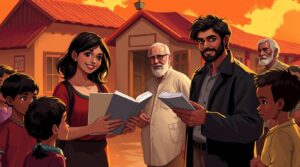
Chapter 20: The Moral of the Story (40 Minutes)
As the story of Lily and Max comes to an end, we reflect on everything they experienced—the challenges, the heartache, the kindness, and the lessons learned. Their journey teaches us many important things about life, hard work, and helping others.
Lily and Max started with nothing. They were orphaned, lost, and alone. But thanks to the kindness of the merchant, they were able to find a new path. Through hard work and learning, they created a better life for themselves.
The first lesson we learn from their story is that helping others can make a big difference. The merchant didn’t have to take in Lily and Max, but he did. He saw their need and offered them love, care, and support. His kindness changed their lives forever.
Just like the merchant helped the children, we can all help others. We can show kindness to those who are struggling, whether they are our family, friends, or people we don’t know. Even small acts of kindness—like sharing a smile or offering a hand—can make someone’s day better.
Another important lesson is about working hard for a better future. Lily and Max didn’t just sit and wait for things to get better. They worked hard in school, started their own businesses, and became successful.
This teaches us that, no matter how hard life may seem at times, hard work pays off. It’s important to keep going, even when things are difficult. When we put in effort and stay focused on our goals, we can achieve great things, just like Lily and Max did.
Finally, we learn that it is important to care for those in need. Throughout the story, we see that when people are in trouble, they need help. The merchant took in the children when they had no one else, and later, Lily and Max returned the favor by helping children in their village. This shows us that when we succeed, we should not forget to help others.
Helping those in need is not only about giving money or things. It’s also about offering our time, our support, and our love. When we help others, we create a community where everyone can feel safe and cared for.
Vocabulary Highlight:
– Support: Helping someone in a difficult time.
– Effort: The hard work you put into something.
– Community: A group of people who live together and care for each other.
– Focus: To pay attention and stay determined to reach a goal.
– Succeed: To reach a goal or accomplish something.
Grammar Spotlight:
– Using modals of advice to talk about life lessons (e.g., “You should help others when they need it.”).
– Using imperatives for giving instructions (e.g., “Work hard for your dreams.”).
Interactive Exercises:
Questions for Learners:
– What lessons did Lily and Max learn?
– Why is it important to help others?
– How did Lily and Max’s hard work change their lives?
Practice Sentences:
– The merchant’s kindness ______ (helped/ignored) Lily and Max.
– Lily and Max worked hard to ______ (build/lose) a better future.
As we finish the story of Lily and Max, we remember the most important lesson: life is about helping others, working hard, and caring for those in need. When we live with kindness and purpose, we can create a better world for everyone.
Just like Lily and Max, each one of us has the power to make a difference. Whether it’s through small acts of kindness, working hard toward our goals, or helping those who need it, we all can contribute to a better future. This is the true moral of the story.
